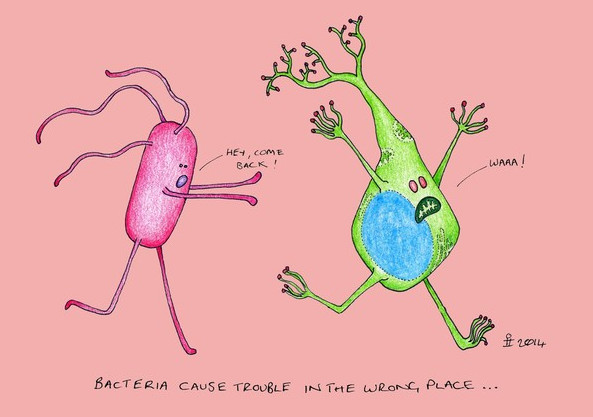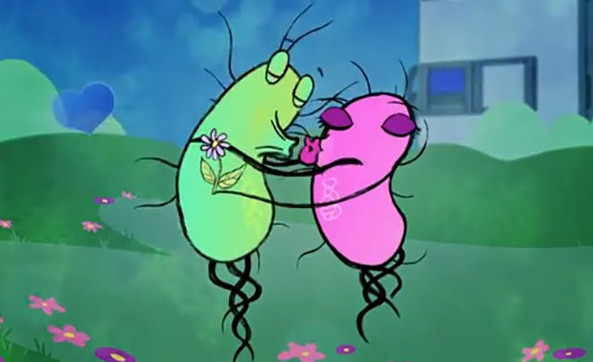Are we living too clean?
In modern life, also try to clean everything as clean as possible, even with a person who is extremely clean. Even though the habit of being too clean is not necessarily a good thing that can even harm our health.
No need to clean everything too clean because it is too harmful
Bacteria are beneficial or harmful?
As early as the nineteenth century, we knew what kind of bacteria caused the disease through the discovery of German doctor Robert Koch. Then, by keeping environmental sanitation and personal hygiene, human health and longevity have improved significantly.

Currently, humanity is living in an era of cleanliness with all kinds of soaps containing antimicrobials, household cleaners also advertised to kill up to 99.9% of bacteria. At the same time, a series of antibiotic drugs are making people nearly repel bacteria from life.
But is it really good to " break it " with bacteria? The answer is no because in fact, not all bacteria are harmful. Even the pathogenic bacteria actually only account for a very small part, while most are extremely beneficial for human health.

Inside the human body, the bacteria synthesize the intestinal vitamins - create a protective layer against the skin against harmful bacteria, help digest food . As for the environment, bacteria help break down organic matter, creating half the amount of oxygen on Earth and balancing the nitrogen content in the air.
Are we living too clean?
In 1989, the British epidemiologist - David Strachan was the first to come up with a ' hygiene hypothesis '. He said that exposure to bacteria from childhood will help us not get allergic when we grow up.

An allergy is actually a disorder from the body's immune system, which considers harmless agents to be dangerous. According to American biologist Dorothy Matthews, the immune system overreacts to beneficial bacteria by forgetting how to live with them.

This army will help you fight allergies.(Illustration).
If the 'hygiene hypothesis' is correct, then we can completely explain the rapid increase in the number of people with asthma and allergies over the past 20 years. And this only proves one thing - we have lived too clean.
In another study, children who were born naturally had a lower rate of allergies than those who had a caesarean section due to early contact with the mother's vaginal flora.
Experts also said that the microorganisms in the body lack diversity not only makes us susceptible to allergies. Good bacteria play an important role for growth, physiology, metabolism, brain function. Therefore, the lack of them can lead to many different diseases.
So what should we do?
The first thing we need to understand is to learn how to balance hygiene and acceptance with the surrounding bacteria.
First, we should not be too obsessed with cleanliness . Let children step on a bit of dirt on the floor than mothers who rush to clean and disinfect because of concerns about bacteria harming them. For example, when a baby's plastic nipple falls to the floor, parents should wash it off instead of "shit" to buy new things. This helps to develop the infant's microbiota, reducing the risk of allergies.

Don't become a clean "frenzy".
Next is what we still do every day - take a bath. You should wash your hands often, because your hands are an easy way to spread the disease. However, the whole body does not need to be so strict. Taking too long a bath or taking a shower too many times a day will be counterproductive, because you have eliminated beneficial bacteria.

In short, . take a little shower.
You should also diversify your meal with a variety of dishes and especially keep a dog or cat to help enrich the microorganisms in your body.
In addition, you need outdoor activity . Areas such as lawns, forests and gardens all contain healthy bacteria that enrich your immune system.

Instead of being in the house, being scared . dirty, go out and enjoy nature.
And finally, it is also very important, not to abuse drugs . Arbitrary use of antibiotics will disturb the balance of bacteria in the body and thereby cause damage to the immune response.
The study has many benefits for human health awareness. Children who grow up in an environment that is not obsessed with cleanliness have a lower rate of allergies and asthma. Some bacteria also actively protect us from intestinal diseases and even anxiety and depression.
* The article demonstrates the views of science journalist Katia Moskvitch posted on BBC Future.
- Living too clean makes children vulnerable to cancer
- Clean water and numbers to speak
- Water collection from the fog
- UNDP: The world has 2.4 billion people who lack clean water
- Plant-derived technology will be the solution to a clean energy problem
- Is the immune system destroyed because it's too clean?
- Distinguish clean pork and worm meat
- The world's largest turbine generator
- The new invention using graphene creates clean water from polluted seawater in a simple step
- Clean technology is lacking capital
- 10 ways to protect the living environment
- Distinguish clean vermicelli and vermiculite
 Green tea cleans teeth better than mouthwash?
Green tea cleans teeth better than mouthwash? Death kiss: This is why you should not let anyone kiss your baby's lips
Death kiss: This is why you should not let anyone kiss your baby's lips What is salmonellosis?
What is salmonellosis? Caution should be exercised when using aloe vera through eating and drinking
Caution should be exercised when using aloe vera through eating and drinking The hidden fuel of the human brain: How gut bacteria shape intelligence?
The hidden fuel of the human brain: How gut bacteria shape intelligence?  New bacteria appear in unexpected places
New bacteria appear in unexpected places  3,600-year-old cheese 'reveals' secrets of ancient food preparation
3,600-year-old cheese 'reveals' secrets of ancient food preparation  Spanish mother and daughter experts 'train' bacteria to restore paintings
Spanish mother and daughter experts 'train' bacteria to restore paintings  NASA is worried about mutant bacteria in the Space Station spreading to Earth
NASA is worried about mutant bacteria in the Space Station spreading to Earth  Identifying the deadly link between oral bacteria and cancer
Identifying the deadly link between oral bacteria and cancer 